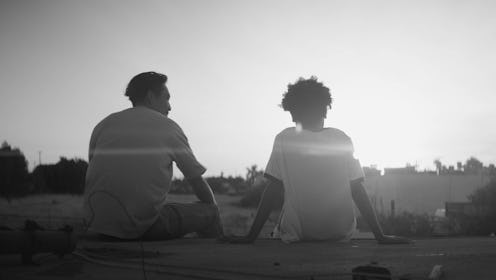Entertainment
'Gook' Could Be A Necessary Conversation Starter
Smashed windows, burning buildings, and a young Black girl alongside a Korean man standing in the midst of destruction in South Los Angeles — these are some of the haunting images portrayed in the new film Gook, which spotlights the 1992 L.A. Riots in powerful detail. It's been 25 years since the riots, which were spurred by the acquittal of four White police officers who had been charged with the assault and beating of Rodney King, who was Black. Yet although much time has passed, Gook brings the events back into our attention, and by doing so, becomes a crucial conversation starter about the past and current state of Black and Asian ties in America.
Justin Chon’s feature film, which premiered at Sundance back in January and will be released this August, shows how the the Black and Asian communities in L.A. connected across cultural divides during the emotionally heightened time of the riots. The film features the city on the verge of pure chaos, and showcases the moments of fear preceding the destruction of South Los Angeles. Judging by the new trailer, it looks like it'll be a scary, visceral movie, and it might prompt some much-needed discussion about race relations and political turmoil.
The movie follows two Korean-American brothers in the early 1990s, Eli (Justin Chon) and Daniel (David So), who run a shoe store in South Los Angeles, serving a mostly Black clientele. The brothers employ a young Black girl named Kamilla (Simone Baker), and the three form a bond which eventually is threatened by the Rodney King verdict. All the characters feel all too real, but Kamilla, specifically, reminds me of Latasha Harlins, the young woman whose controversial death prompted much of the racial unrest in South LA in the '90s.
Harlins' death, as well as King's beating, became symbols of the dangers and indifference faced by African Americans in L.A. during that time period. The high-profile cases heightened tensions between Koreans and Black residents of L.A., and when the riots erupted, more than 2,000 Korean-owned businesses were destroyed and $400 million in commerce and property was lost, events that Gook dramatizes for the screen.
The L.A. riots are rarely depicted in movies and on TV, and Gook looks like it will explore both the causes of the Korean-Black tensions and the effects the riots had on all members of society living nearby. The topic is a painful one, and still relevant today — just two months ago, a Korean beauty supply owner was caught on video assaulting a Black woman, causing an uproar on social media — and it's so important that a movie puts it front and center.
In today's political climate, tensions over race and politics are higher than ever, and it's crucial that we take a step back before making assumptions about others or inciting distrust. Movies like Gook can help to open our minds to different cultures and experiences, and give us all a better understanding of how systematic racism and prejudice works in society. So many issues like the L.A. Riots and the culture of discrimination surrounding the events rarely get discussed; I hope that Gook will be an important conversational platform for people of all backgrounds to talk about the ways we view one another and work towards a more harmonious future.
